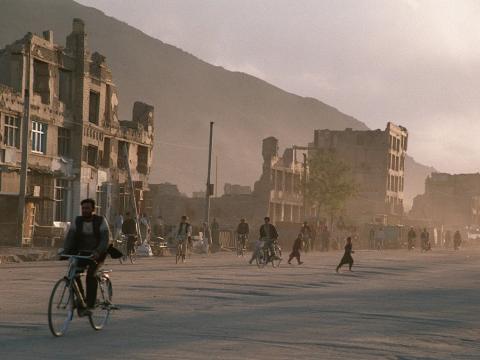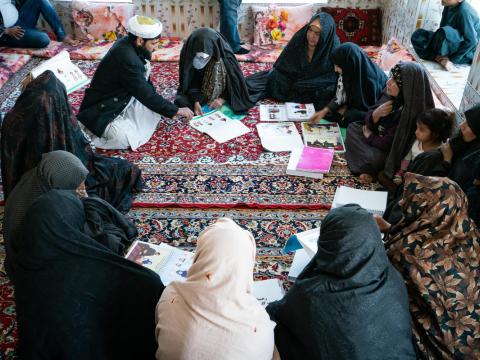
Twenty years in Afghanistan and the past comes full circle
James reflects on the experience of delivering aid in Afghanistan
(First published on civilsociety.co.uk)
As the last US planes flew out of Kabul’s international airport it felt like the dreams and aspirations of Afghans – along with the trajectory of my own humanitarian career – had come full circle, returning to where things started some 20 years ago.
In April 2002, former King Mohammad Zahir Shah flew into at that same airport after a 29-year exile. I watched his plane touch down, standing precariously on top of a shipping container just beyond the control tower in order to get a view. The former king, brought in to serve as a fatherly figurehead for the country, was then whisked off into the capital under the protection of NATO forces.
The last few days has seen that all history reversed. This time, it was President Ashraf Ghani who fled Afghanistan for exile later followed by the US and its allies, along with tens of thousands of desperate Afghans. Some of Afghanistan’s brightest and best were on those flights.
The sense of uncertainty and fear at this sudden turn of events is palpable among Afghan colleagues who have remained. They wonder what the future holds for them but worry even more for their children. Will their daughters continue to have opportunities, will women be able to work and will Afghans be able to live in peace? They fear that the bombing and mass casualties inflicted by the Kabul airport bomb a few days ago could be a precursor of more violence to come. Can relations even be built with the new government and is there space for civil society?
Aid workers are feeling exhausted and overwhelmed
There is also despondency in the humanitarian community. Aid workers around the world have been inspired by Afghans over the years bravely advocating for peace, by girls pursuing their studies to become young leaders and by women striving to be heard in politics and pushing for an expansion of their rights.
This is personal for aid workers because so many have spent time in Afghanistan. And on top of this crisis come so many other disasters: the Haiti earthquake, conflict and hunger in Ethiopia and the threat of widespread famine and starvation elsewhere. These emergencies – along with Afghanistan – seem to be history repeating itself and with Covid-19 and climate change, in the mix, aid workers are feeling exhausted and overwhelmed.
At times of such heartache and in the midst of feeling powerless in the face of such present suffering, I think it can be helpful to dig into the past, to go in search of hope. People cannot live without hope and sometimes hope might be all that is left.
When I arrived in Afghanistan in 2002 following the US and allied forces invasion, it was my first deployment as an aid worker. I was a rookie but I learned a lot on that assignment. My employer, World Vision, was growing its humanitarian response out of Herat in western Afghanistan and a team of us travelled northwest to Badghis, a conservative rural province.
We had just funded a new school for girls there where there had been none before. The children were so excited to be there. At the end of the day, as they rushed joyfully out of the gates screaming and laughing, and as they did an old man hit several with a long cane and sternly told them to be quiet. It shocked me but the girls just ran on laughing and skipping through the streets in their new school uniforms. Many of those girls will now be in their thirties and mothers themselves. They will want the same for their daughters.
Building trust
The days running up to the arrival of the former king in April 2002 were some of the most memorable in my 20-year career as a humanitarian. Although operations had already started in the West, World Vision needed to get registered with the new government in Kabul and so we decided to meet the ministry of education representatives at a restaurant since we had no office space. I use 'restaurant’ loosely because at that time Kabul was a mess of shelled buildings with hardly a wall unmarked by gunfire.
A whole cohort of large, bearded and rather fearsome looking men who had squeezed into suit jackets turned up. I suspected that just a few months before they had probably been serving with the mujahadeen before the invasion gave them the keys to the government. We sat around the table trying to be polite, going at the lamb shanks with knives and forks until finally we guffawed with laughter, threw the cutlery on the table and proceeded to tear at the meat with our hands and teeth. Needless to say, registration followed not long afterwards, officialising ourselves with the new government.
This is in practice how relations will be built with Afghanistan’s new leaders. Meals and jokes and photographs of families will be shared. Trust will be built and across those bridges the possibilities of what can be, will be carried. In Afghanistan, colleagues tell me this process has already started, even if it is simply at first about fostering relations with those who are manning the Taliban checkpoints. Aid agencies are experts at doing this type of thing, finding the power brokers to build relations with and the spaces to grow operations.
Above everything else this crisis has reminded me that Afghanistan will not be rescued or saved or rebuilt by foreigners. Afghanistan is the destroyer of empires and no amount of military might will fashion it in the way outsiders want.
This is also true for every other humanitarian context. Countries and civil society are built from within by their own people and humanitarian aid workers and foreign soldiers who forget that do so at their peril. This is what my agency has strived to do: empower local leadership, work with partners and foster talent.
There is even hope in reminding ourselves of this powerful and dignifying truth, that even in the face of so much uncertainty, ultimately Afghanistan and its future belong to Afghans.
James East is emergency communications director for World Vision
Click here to visit the original article on civilsociety.co.uk
